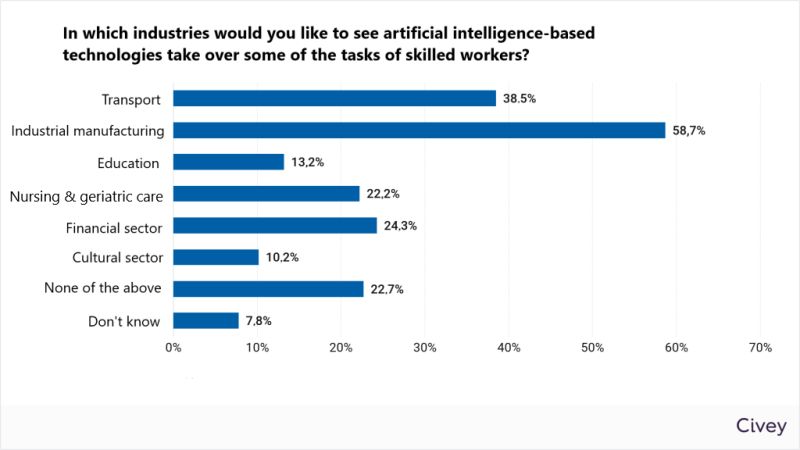- In industrial manufacturing, almost 60 per cent of Germans are in favour of using AI to address these skills shortages
- In the cultural and education sectors, only one in ten want to use AI
Germany lacks skilled workers. Not only is there a shortage in the care and catering sectors, but the STEM (science, technology, engineering and mathematics) professions are particularly affected. The German Economic Institute (IW) MINT Autumn Report 2023 identified a shortage of 285,800 people. Artificial intelligence could help alleviate this skills shortage in the future, and Germans are generally in favour of it in many sectors.
In industrial manufacturing in particular, 58.7 per cent of Germans would like to see artificial intelligence-based technologies take over tasks from skilled workers. Many Germans are also in favour of using AI in the transport sector (38.5%), the financial sector (24.3%) and in nursing and geriatric care (22.2%), according to a recent representative survey conducted by the market and opinion research institute Civey*. In the cultural sector, only one in ten (10.2 per cent) would like to see AI replace skilled workers, while the situation is similar in the education sector, where only 13.2 per cent want to use AI.
“The integration of artificial intelligence in various industries and fields of work can make a significant contribution to alleviating the shortage of skilled workers in Germany,” says eco Chair Oliver Süme. “Through automation, accelerated recruitment or targeted training with the help of AI, companies can work more efficiently and make optimal use of the existing labour pool,” Süme adds. “AI can also take over time consuming administrative work in social professions, so that people continue to be at the centre of nursing and geriatric care staff.”
AI ecosystems create growth potential
As a highly developed business location, Germany has the potential to take a leading role in AI in Europe or even worldwide. “But we also need momentum from politicians; we need EU-wide standardised criteria in the application of the European AI Regulation and in dealing with AI systems. The mistakes of the GDPR must not be repeated – Germany and other EU Member States should not go their own national ways when it comes to regulating GPAI models and high-risk systems. A truly level playing field in Europe requires harmonised obligations, requirements and standards.”
According to the eco Industry Monitor, AI can increase productivity by 0.8-1.4 per cent per year. Using LLMs (Large Language Models) such as ChatGPT, 15 per cent of all work tasks can already be done faster and with the same quality, and this figure could rise to 56 per cent in the future. Businesses can start with AI, for example, through the new AI ecosystems that are currently being created across companies and even industries, such as the eco initiative “AI in Practice”, which also offers assistance with questions relating to data protection and the security of new AI business models.
*On behalf of eco, the opinion research company Civey surveyed around 2,519 German adults between 12 and 13 February. The results are representative. The statistical margin of error for the overall results is 3.3%.





